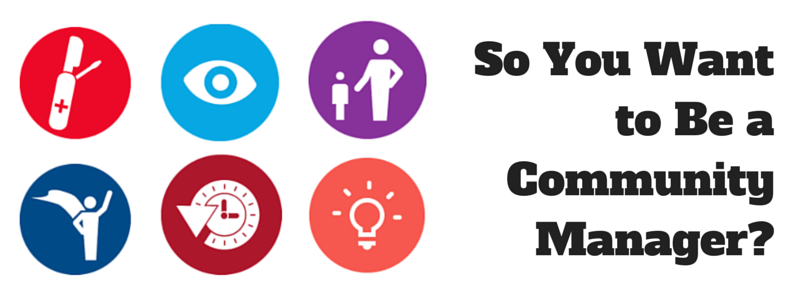
Note: This post was
originally published at CMSWire.
Because I write a lot about online communities and online community management, I've had people ask me, “I’d like to make a career change into community management. Where do I start?” The first thing I tell them is that I’m not a community manager. But I quickly follow by saying that I work with community managers and that they’re the target audience for much of the content I develop.
What follows are steps that aspiring online community managers can use for a career change into this increasingly popular role. But before we go further, let's clarify the terminology: this column is not about social media management, but about managing branded, online communities.
Quick Self-Assessment
Before you jump in head first, ask yourself a few questions to validate that community management is right for you. Let’s start with these:
- Do you like to help people?
- Would you consider yourself empathetic?
- Do you enjoy participating in discussions in LinkedIn Groups?
A strong “yes” to each of these questions signals a good match.
But here’s the best proxy of all, one that combines many aspects of online community management: are you active on Twitter? If you like to find, discover and follow new people; retweet information you find interesting; and engage with people who reply to your tweets, then chances are community management is a good fit (bonus points if you get excited when you see new “Notifications” waiting for you).
Consider the
traits that are common among community managers and confirm (with yourself!) that you have them.
Think Ahead: Career Growth and Career Path
Think beyond the next job to what lies ahead after that. Would you like to grow to become the world’s leading community manager? Or would you like to grow into a more senior role, such as the Director of Community or Chief Community Officer?
An infographic published by
The Community Roundtable notes that Directors of Community are more likely to have these skills:
- Program management
- Building a community roadmap
- Developing executive support and coaching executives
- Creating, purchasing or delivering training
- Hiring and managing community team members, contractors, agencies
- Internal consulting
Do these skills (i.e., tasks) sound appealing to you? Or would you prefer to stay more “hands on” doing day-to-day community management? Think about this because it will help guide your career journey.
Find and Connect with Community Managers
Find people serving the role that you aspire to attain. Judging by my experience online, community managers are a kind, personable and engaging bunch. They’re community managers, after all! On Twitter, start following the hashtag “#cmgr” and see who’s tweeting. Chances are, more than half of them are practicing community managers.
You’ll also find community managers during weekly chats and hangouts. First, there’s “#CMGRChat,” a Twitter chat that takes place every Wednesday from 2pm to 3pm ET. Next, there’s “#CMGRHangout” a video hangout (with associated tweeting) that happens every Friday from 2pm to 3pm ET.
As you connect and engage with community managers, politely ask them if you could spend a few minutes talking to them about their careers. Once you get them on the phone (or in a video chat), here are some questions to ask them:
- How did you make the move into community management?
- Tell me about a day in the life of a community manager?
- How are you measured or evaluated within your organization?
- What are some of the challenges you face as a community manager?
It’s All About the Resources
If you were making this career move two or three years ago, there were limited resources available. There’s much more available now and the set of useful resources continues to grow.
Pick up a copy of the book “Buzzing Communities” by Richard Millington. The book is deep in both community strategies and tactics. You’ll find yourself referring to it every day on the job.
Also visit Millington’s website,
FeverBee, for additional tips and insights. Next, I recommend regular visits to CMX Hub, Community Roundtable and Leader Networks. They provide a mix of high level guidance and strategies, along with tales from the frontlines of community management.
To complement these online resources, there’s a growing number of face-to-face events that focus on community management. These events help you meet and connect with fellow community managers, and learn a lot while doing so.
In the Bay Area alone, there are regular gatherings of the
SFCMGR Meetup Group, as well as events such as FeverBee SPRINT and CMX Summit.
Final Step: Start a Blog
“You want to find a new job? You have to stop thinking like an advertiser of a product and start thinking like a publisher of information.”
This quote is from a
blog post by David Meerman Scott. Scott's post has influenced my own career journey, as I started blogging when I was in between jobs. As an aspiring community manager, review what the experts are tweeting and writing about, then provide your own perspective on it. The more you write, the more likely you’ll be discovered. And in the process, you’ll learn valuable community management skills: writing clearly, responding to feedback, promoting content, etc.
The Timing's Right
Community management, as both a discipline and a job function, is starting to take off. There’s never been a better time to become a community manager: you’ll have an army of pioneers to show you the way, online resources to keep you busy and face-to-face events to bring it all together.
So you want to be a community manager? Best of luck. And have fun.